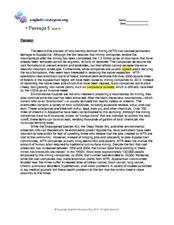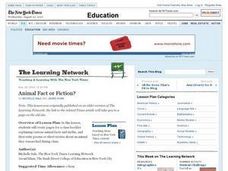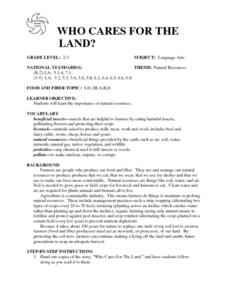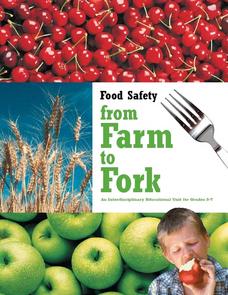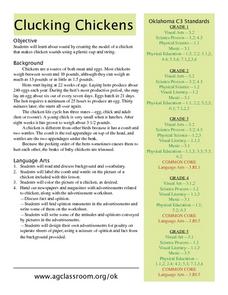Curated OER
Lesson 3: Proving Facts and Forming Opinions
Time for Kids: Butterflies is used to model the process of determining if a text is based on fact or opinion. Children are taught how to skim for key words, and use headings or chapter names to locate proof of whether or not what...
Curated OER
Reading Comprehension 5: Level 10
Whether used as a reading comprehension assessment, as the basis of a mini-lesson on reading strategies, or as extra practice, this exercise will prove to be valuable because of the answers and explanation key that accompanies the...
Curated OER
Fact or Opinion Graphic Organizer
In this graphic organizer worksheet, students read the difference between a fact and an opinion. They identify a topic and write facts or opinions in the chart to help them organize their thoughts and information.
Curated OER
Animal Facts and Opinions
In this fact and opinion learning exercise, students read 20 informative sentences about animals. Students write "fact" or "opinion" for each sentence.
Curated OER
Animal Fact or Fiction?
Read and discuss the article "Welcome to Cicadaville (Enter at Your Own Risk)" to gain a better understanding around the confusion regarding cicadas and locust swarms. In groups your young analysts research statements about animals to...
Serendip
Golden Rice – Evaluating the Pros and Cons
More than half the world's population eats rice as a daily staple ... imagine if that rice could prevent illness. Scientists genetically engineered rice to include vitamin A for just that purpose. However, room for debate still exists....
Curated OER
Lead Critical Reading
Students read opposing views on the lead contamination issue, identify the facts and opinions in each article, and infer the opinion of the author. They create an essay expressing their opinion on the issue complete with citations.
Curated OER
Water and Sewage Critical reading
Learners read three articles with different points of view on the water and sanitation issues in the Florida Keys. They identify the facts and opinions in each article and write a summary. In addition, they write an essay expressing...
Curated OER
Food Myths Critical Thinking and Reading
Students read a series of statements made by students about the hazards and benefits of various foods. They distinguish the "facts: from "opinions" in the dialogue, summarize the facts in a short paragraph, and write an essay...
Curated OER
Endangered Rain Forest Research and Opinion Paper
In this endangered rain forest research and opinion research worksheet, students research factors that cause the destruction of rain forest. They read two opinion statements before deciding on one to respond to with data from their...
Curated OER
LESSON #2 SAFETY UNIT: Real-life reading selection
When studying pollution and the environment, you can use this activity as an enrichment. Safety-conscious learners read a 2005 article about an ammonia leak from a Kentucky fast-food product plant. They work in small groups to discuss...
Beyond Benign
Medical Ethics
Just because we have the ability to determine an organism's traits through genetic testing, should we do it? Middle-school medical experts examine the ethical dilemmas in biotechnology in the 18th and final installment in a series of...
EngageNY
TASC Transition Curriculum: Workshop 12
How can opinions slant facts? Workshop participants learn how to examine primary and secondary sources and identify the author's point of view. They also examine how visual art impacts the meaning and rhetoric of sources. Full of...
Curated OER
Ethical and Critical Thinking: Genetically Modified Food
Students read statements representing different points of view on Genetically Modified Food. They identify the "facts" and "opinions" in each statement, and then briefly summarize the issue of Genetically Modified Food in a short...
Curated OER
Leap! Frog!
Students write a report stating facts and opinions based on frogs. Investigate and understand the changes that take place during the life cycle of a frog. Respond to language, meanings and ideas in different texts, relating them to...
Curated OER
Who Cares for the Land?
A very thorough lesson plan focuses on what plants need to grow and stay healthy. There are excellent reading activities and worksheets included in this fine plan. A terrific way to introduce a unit on plants and their needs.
Personal Genetics Education Project
Genetics and Reproduction
Disease prevention or designer babies? Use a set of slides to introduce the growing practice of preimplantation genetic diagnosis, or PGD. Teens read related articles and then break into groups to address different scenarios. Afterward,...
Curated OER
Up, Up, and Away
Students research hot-ballooning using Internet resources including an around-the-world balloon flight. They determine fact from opinion, examine point of view, and determine main idea, and details. They write a journal entry taking the...
Curated OER
Food Safety From Food To Fork
Students are introduced to the concept of food safety. In groups, they distinguish between fact and opinion and cause and effect while participating in a board game. They write an essay about what knowledge they gained and review the...
Global Oneness Project
The Consciousness of Nature
Scholars voice their opinions about animal consciousness with an article that challenges common ideas about nature. After reading the article, learners engage in a thoughtful discussion before writing out their arguments...
Curated OER
Genetic Engineering: Friend or Foe?
Students brainstorm and discuss ways genes can be altered, transferred and cloned. They will complete a subject sampler, opinion paper and prepare to debate their opinion on genetic engineering.
Curated OER
Clucking Chickens
A comb, wattle, and beak are three characteristics that describe a chicken. Your class can explore the life of a chicken through reading, art, movement, and music. Using a plastic cup and string, they'll create a pretend chicken that...
Curated OER
The Farmer Cares for the Land
Students explore farming by creating visual demonstrations. In this agriculture lesson, students read assigned text about a farmer's duty and identify the events that have taken place in the history of agriculture. Students collaborate...
Curated OER
Ida Tarbell: Hysterical Woman vs. Historical Facts
Young scholars examine journalism and its different styles. In this effective communication instructional activity students create an editorial message and articulate an article.

